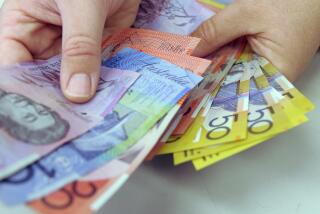New $100 Bill Will Join the Old Ones in Wallets of the World
- Share via
Everybody loves the American dollar.
From Israel to Poland, Mexico to Nigeria, people who worry about wars, revolutions, or the irresistible urge of governments to run the printing presses overtime all put their faith in the greenback.
That’s why the officials in charge of U.S. government finance took great pains recently to say over and over that, although a new $100 bill is on the way by 1996, the old ones still will be good.
They announced a new design for the $100 bill to foil counterfeiters--moving Ben Franklin’s portrait to the left, making it 50% larger and adding a second picture of the Founding Father as a watermark--but said the United States will never, ever repudiate the old bills.
Why not? After all, the ordinary, law-abiding American citizen hardly ever sees a $100 bill, except maybe as a birthday present.
“Most Americans simply don’t have many transactions with $100 bills,” said U.S. Rep. Bill McCollum (R-Fla.), a member of the House Banking Committee.
By contrast, there are so many bogus C-notes floating around the world that it often takes special effort to reassure people that a bill is real. McCollum, for instance, carries around a well-worn $100 bill from the money markets of the Middle East. It bears signed endorsements from local money-changers and even a stamp from a Lebanese bank certifying that it is genuine.
From time to time, someone in law enforcement says something like this:
“Let’s call in the old $100 bills and hurt the cocaine peddlers, crack dealers, Mafia extortionists and other folks whose illegal profits are held in big bills. As an extra benefit, we could catch some regular citizens trying to take cash out of their businesses without giving the IRS its due.”
The idea: Strike a blow at crime, both free-lance and organized, and raise some cash to help with the federal deficit.
The Treasury could announce one morning, without warning, that all existing $100 bills would stop being legal tender the next Jan. 1. The message would be simple: Just bring in your old $100s to designated banks and exchange them for new ones.
And while you’re at the bank, by the way, give the teller some proof of identity, your name, address, line of business and Social Security number.
Forget this scenario, says the Treasury; it’s an impossible dream. “We have no intention whatsoever of having any form of recall,” Deputy Treasury Secretary Frank Newman said. “There has never been one and we don’t intend to have one now.”
Plenty of legitimate people use $100 bills, notably in the jewelry trade and in fine restaurants, according to Newman. And some people simply prefer to deal in cash rather than checks.
But the biggest reason for not tampering with the sanctity of the old bills is the vast popularity of the dollar abroad. There is $357 billion worth of U.S. currency in circulation. The $100 bill accounts for $200 billion of the total--and about 60% of the big bills are held abroad.
The Federal Reserve Board, which regulates the money supply to keep inflation under control, has learned to stop worrying about the rapidly rising volume of currency in circulation. Cash is plentiful, but it isn’t driving up domestic prices.
Instead, the currency is flowing across the borders in a torrent, Fed Chairman Alan Greenspan told a recent Senate hearing.
“Vast amounts of currency have become an important part of the financial systems of a lot of countries out there,” he said. The German mark is popular, too, as a second currency. But the U.S. dollar is uniquely desirable as a tool for trade, a way to keep wealth hidden from the government and a safety net with which to flee if politics goes bad.
“Sound as a dollar” evidently still means something outside U.S. borders. People “could keep their assets in gold or something else, but it’s a tribute (that) they keep it in dollars,” Newman said. The $100 bill is perceived as safe, no matter what happens to the local government and currency.
Recall and replacement of the old bills would also be a logistic and political nightmare, Newman noted. The Treasury would have to make arrangements with governments in 100 or more countries--many plagued by corrupt or dictatorial governments--to set up systems for exchanging the bills.
Not to mention of betrayal of faith for foreigners losing the safety and privacy of holding dollars.
The Treasury will keep printing $100 bills, and they will keep flowing outside the United States. People all over the world can go to bed without worrying, secure because they have some Ben Franklins tucked in their wallet or buried in the back yard.
More to Read
Sign up for Essential California
The most important California stories and recommendations in your inbox every morning.
You may occasionally receive promotional content from the Los Angeles Times.













